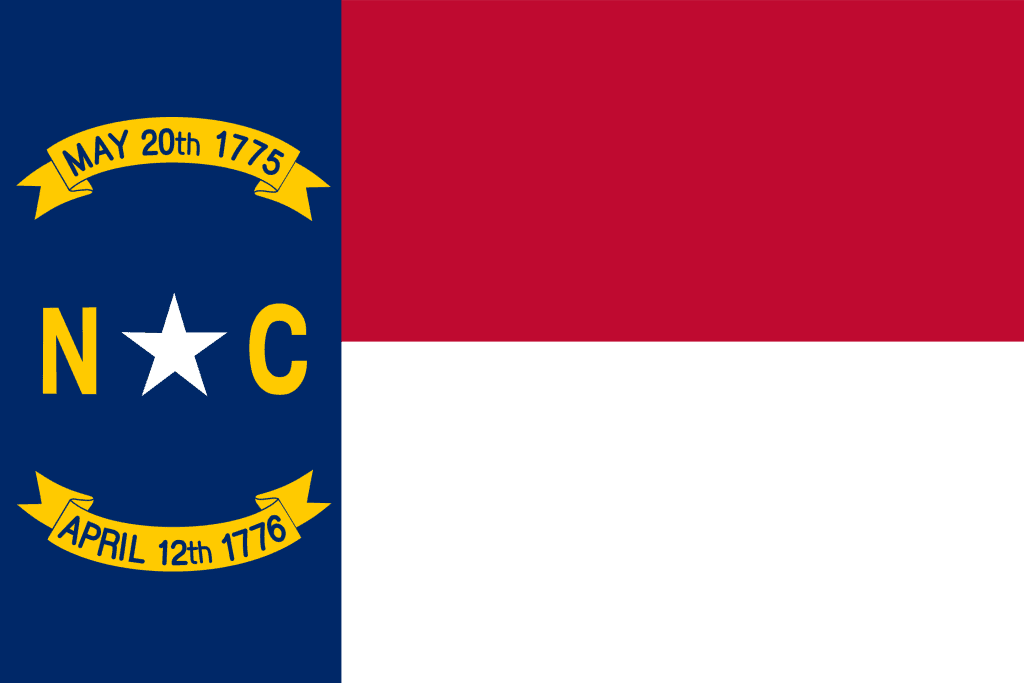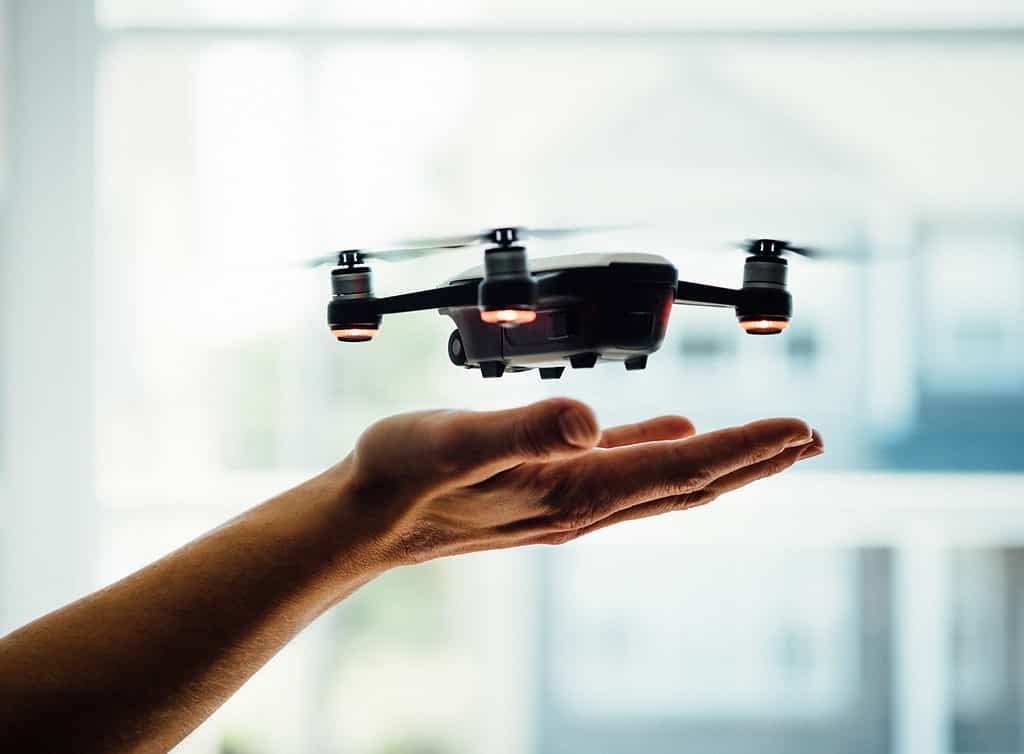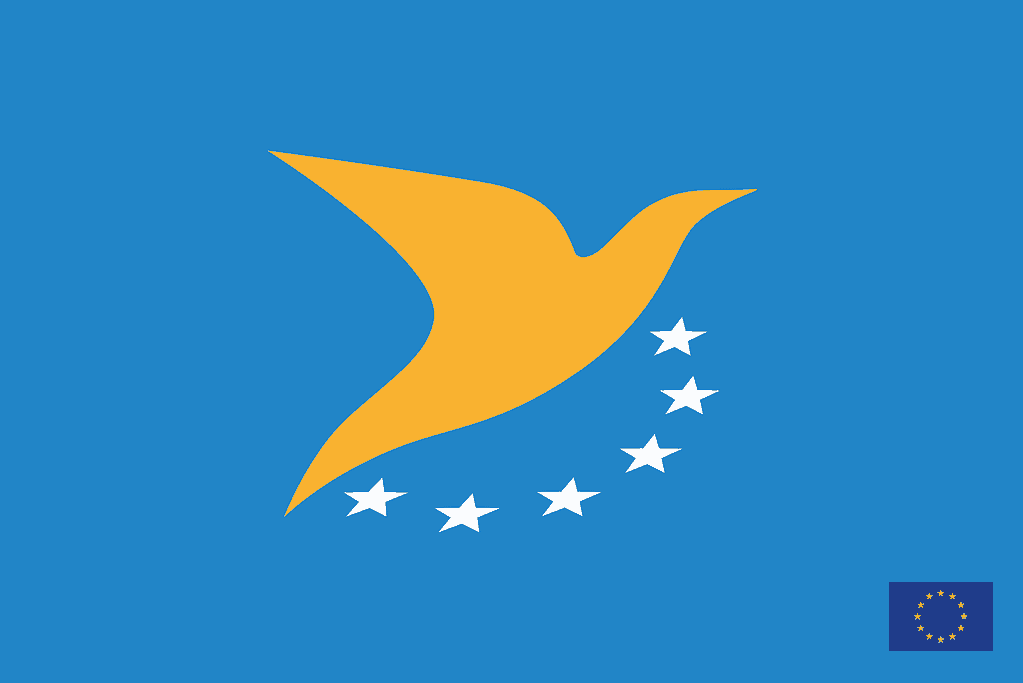Summary of Drone Laws in North Carolina
Hobbyist Drone Laws For Residents of North Carolina and USA
Drone Operations in North Carolina are regulated.
- Hobbyist drone flights are allowed
- Hobbyist drone pilot license may be required for certain operations.
- A TRUST Test is required.
- Hobbyist Drone registration is required for hobbyists flying a drone of more than 0.55 lbs.
- Drone Remote ID is required for hobbyists.
- Drone Insurance is not required but recommended for hobbyists’ drone operations
Read below for more details on Hobbyist Drone Laws in North Carolina and to find links to regulators and other credible sources!
Commercial Drone Laws For Residents of North Carolina and USA
Drone Operations in North Carolina are regulated.
- Commercial drone flights are allowed
- A commercial drone pilot license is required
- Commercial Drone registration is required in North Carolina
- Drone Remote ID is required for Commercial Drone Operators.
- Drone Insurance is not required but recommended for commercial drone operations
Read below for more details on Commercial Drone Laws in North Carolina and to find links to regulators and other credible sources!
Drone Laws For Foreign Visitors To North Carolina (not USA Residents)
Drone Operations in North Carolina are regulated.
- Foreign visitor drone flights are allowed in North Carolina
- Foreign visitor drone pilot license is required
- Drone registration is required for visitors/tourists
- Drone Remote ID is required in North Carolina for tourists..
- Drone Insurance is not required but recommended for tourist drone operations
Read below for more details on Drone Laws in North Carolina for Visitors (Tourists) and to find links to regulators and other credible sources!
Drone Laws For Government Drone Operators
Drone Operations in North Carolina are regulated.
- Government drone flights are allowed in North Carolina
- Government drone pilot license is required
- Drone registration is required for Government operations
- Drone Remote ID is required in North Carolina for Government operations..
- Drone Insurance is not required for Government drone operations
Read below for more details on Drone Laws in North Carolina for Government Drone Operations and to find links to regulators and other credible sources!
Agencies Responsible for regulating drones in the State of North Carolina
Drone Regulator in the USA: Federal Aviation Administration (FAA)
Contact Information
If you need additional details we have not covered or specific case assistance, you can contact the FAA directly at:
- Address: 800 Independence Avenue, SW, Washington, DC 20591
- Phone: 844-FLY-MY-UA (+1 844-359-6982) (Some users have indicated that this number tells you to use the email below and hangs up)
- Email: UAShelp@faa.gov
Please continue reading for more details on USA Drone Laws.
UAS Laws – General rules for flying drones in North Carolina
Drone operation in North Carolina is broadly governed by The Federal USA agency responsible for drone safety, the FAA. Click here for details on FAA USA Drone Laws.
In addition, the North Carolina state legislature has enacted several supplemental rules specific to North Carolina drone operations. The highlights are enumerated below.
Are drones allowed in North Carolina?
Drones are allowed in North Carolina for recreational and commercial use, subject to FAA regulations and flight controls by local governments. Read on for details.
Specific additional drone use laws by the State of North Carolina legislature
This state law establishes regulations and guidelines for North Carolina recreational, commercial, and government drone operations.
Recreational Drone Operators
Recreational drone operators do not have to obtain a license or permit from the Division of Aviation.
Although not required, the Division encourages recreational drone users to take the N.C. Department of Transportation’s Unmanned Aircraft System Operator’s Knowledge Test to learn the rules and regulations for operating drones in North Carolina.
Commercial Drone Operators
- Commercial drone operators must be at least 16 years old.
- Commercial drone operators must take and pass the N.C. Department of Transportation’s Unmanned Aircraft System Operator’s Knowledge Test – a prerequisite to applying for a state permit.
- To obtain a permit, drone operators must provide proof of their remote pilot certificate or other authorization from the FAA to conduct commercial unmanned aircraft system operations (see above, “Federal Restrictions & Requirements).
- Permitted operators agree to these terms and conditions.
Government Drone Operators
- Government drone operators must be at least 16 years old.
- Government operators must take and pass the N.C. Department of Transportation’s Unmanned Aircraft System Operator’s Knowledge Test and then apply for a state permit.
- Permitted operators agree to these terms and conditions.
15A-300.1 Restrictions on use of UAS
General Prohibitions. – No person, entity, or State agency shall use an unmanned aircraft system to do any of the following:
Conduct surveillance of:
- A person or a dwelling occupied by a person and that dwelling’s curtilage without the person’s consent.
- A private real property without the consent of the property’s owner, easement holder, or lessee.
Photograph an individual, without the individual’s consent, for the purpose of publishing or otherwise publicly disseminating the photograph. This subdivision shall not apply to newsgathering, newsworthy events, or events or places to which the general public is invited.
Law Enforcement Exceptions. – The use of unmanned aircraft systems by law enforcement agencies of the State or a political subdivision of the State is not prohibited in the following instances:
- To counter a high risk of a terrorist attack by a specific individual or organization if the United States Secretary of Homeland Security or the Secretary of the North Carolina Department of Public Safety determines that credible intelligence indicates that such a risk exists.
- To conduct surveillance in an area within a law enforcement officer’s plain view when the officer is in a location the officer has a legal right to be.
- If the law enforcement agency first obtains a search warrant authorizing the use of an unmanned aircraft system.
- If the law enforcement agency possesses reasonable suspicion that, under particular circumstances, swift action is needed to prevent imminent danger to life or serious property damage, to forestall the imminent escape of a suspect or the destruction of evidence, to conduct pursuit of an escapee or suspect, or to facilitate the search for a missing person.
- To photograph gatherings to which the general public is invited on public or private land.
15A-300.2 Regulation of launch and recovery sites
- No unmanned aircraft system may be launched or recovered from any State or private property without consent.
- A local government unit may adopt an ordinance to regulate the use of the local government’s property to launch or recover unmanned aircraft systems. (2014-100, s. 34.30(a).)
(This includes state parks – North Carolina administrative code 13B.1204 prohibits drones from ascending or taking off within or upon any state park area or state park water surface. UAS may be operated after obtaining a special activity permit from the Park.)
15A-300.3 Use of an unmanned aircraft system near confinement or correctional facility prohibited
Prohibition. – No person, entity, or State agency shall use an unmanned aircraft system within either a horizontal distance of 500 feet or a vertical distance of 250 feet from any local confinement facility, as defined in G.S. 153A-217, or State or federal correctional facility.
Penalty. – The following penalties apply for violations of this section:
- A person who uses an unmanned aircraft system (i) in violation of subsection (a) of this section or (ii) according to an exception in subsection (b) of this section and who delivers, or attempts to deliver, a weapon to a local confinement facility or State or federal correctional facility is guilty of a Class H felony, which shall include a fine of one thousand five hundred dollars ($1,500). For purposes of this subdivision, the term “weapon” is as defined in G.S. 14-401.24(c).
- A person who uses an unmanned aircraft system (i) in violation of subsection (a) of this section or (ii) under an exception in subsection (b) of this section and who delivers, or attempts to deliver, contraband to a local confinement facility or State or federal correctional facility is guilty of a Class I felony, which shall include a fine of one thousand dollars ($1,000). For purposes of this subdivision, the term “contraband” includes controlled substances, as defined in G.S. 90-87, cigarettes, alcohol, and communication devices but does not include weapons.
- A person who uses an unmanned aircraft system in violation of subsection (a) of this section for any other purpose is guilty of a Class 1 misdemeanor, which shall include a fine of five hundred dollars ($500.00).
14-7.45 Crimes committed by use of UAS
All crimes committed by use of an unmanned aircraft system, as defined in G.S.15A- 300.1, while in flight over this State shall be governed by the laws of this State, and the question of whether the conduct by an unmanned aircraft system while in flight over this State constitutes a crime by the owner of the unmanned aircraft system shall be determined by the laws of this State.
14.280.3 Interference with manned aircraft by UAS
Class H felony to any person who willfully damages, disrupts the operation of, or otherwise interferes with a manned aircraft through the use of an unmanned aircraft system, while the manned aircraft is taking off, landing, in flight, or otherwise in motion.
14.401.24 Unlawful possession and use of UAS (Weapon attached)
It shall be a Class E felony for any person to possess or use an unmanned or unmanned aircraft system with a weapon attached.
It is a Class 1 misdemeanor to fish or to hunt using an unmanned aircraft system.
It is a Class A1 misdemeanor to publish or disseminate images taken through infrared or other thermal imaging technology attached to an unmanned aircraft system revealing individuals, materials, or activities inside of a structure without the property owner’s consent.
Specific additional UAV laws by local governments within North Carolina
Town of Beech Mountain | Municipal Ordinance // 2017
Town ordinance No. 2017 prohibits drone operations from all town-owned property without official written permission, granted by the Town Manager or designee. Banned areas exist to maintain public safety, including common regions and public vehicular areas.
Town of Chapel Hill | Municipal Ordinance
The regulations adopted for the town will be the same as the existing federal laws for small aircrafts, the Code of Federal Regulations Title 14, part 107 of the Federal Aviation Administration.
City of Kannapolis | Municipal Law
This city ordinance prohibits operating unmanned aerial vehicles (UAV), including drones and other types of flying machines, in all city parks. The only exception is for those granted special permission from the city manager.
UAS operation rules in Parks, Recreation, and Cultural Preserves
This administrative code prohibits the take-off, ascending, and recovery of any airplane from all state parks and state park waters. That includes drones and all other types of UAS and flying contraptions. The only exception is those who have a permit to operate at Jockey’s Ridge State Park or a Special Activity Permit to fly, issued by the park authority.
Gaston County | Parks & Recreation Drone Policy
This county policy bans all drone operations from Gaston County Park. Exceptions are available for pilots with a special permit (written license) by the department. Otherwise, drone operations are restricted to the special use facility at Lewis Brooks Airfield, Bessemer City.
City of Raleigh | Parks, Recreation, & Cultural Resources Drone Policy
This city policy sets out the parks, recreational spaces, and cultural areas that allow/disallow drone operations. Current UAS bans include the following:
- Nature preserves
- Nature parks
- Wetland centers
- Cemeteries (graveyards)
- City lakes
Six parks have designated areas for recreational drone use between dawn and dusk.
- Baileywick Park
- Eastgate Park
- Spring Forest Park
- Marsh Creek Park
- Dorothea Dix Park
- Southgate Park
Specific additional UAV laws in Jurisdictions within North Carolina
Counties or towns within North Carolina may have specific restrictions within their jurisdictions. We recommend checking the local jurisdiction for the latest regulations.
Notes for recreational drone pilots flying for fun in North Carolina
If you have a small drone of less than 55 pounds, you can fly recreationally by following the Drone Laws in the USA defined by FAA Part 107 guidelines.
IN NORTH CAROLINA, recreational UAS operations (i.e., flying for recreational purposes) are approved under Federal law, specifically the FAA Part 107. Please check the specific state jurisdiction for additional permissions, licensing, or clearance requirements.
Following these rules will keep you and your drone safe. And that helps keep the airspace available to everyone.
All recreational flyers must pass an aeronautical knowledge and safety test. The Recreational UAS Safety Test (TRUST) meets this rule. If law enforcement or FAA personnel ask, you must provide proof of passage.
TRUST provides education and testing on important safety and regulatory information. If you fly your drone recreationally under the Exception for Recreational Flyers, you must pass the test before you fly.
Note: If your drone weighs more than .55 pounds (lbs), you must register your drone through the FAA’s Drone Zone.
For a complete discussion on drone registration, see our Drone Registration Explainer.
To fly your drone as a recreational flyer, it’s as easy as 1-2-3
- Understand recreational flying requirements.
- Note: Non-recreational drone use is when you fly drones for business or to help out, not just for fun. For example, real estate agents may use drones to photograph houses they sell. Roof inspectors might use drones to get a closer look at roofs. A high school might have someone fly a drone to record football games and post videos on their website. Doing volunteer work with drones also counts as non-recreational use. So, non-recreational drone use is any time you operate a drone for useful work. Or help others out. It is when you are not just doing it to enjoy flying it for hobby or sport. If you’re unsure which rules apply to your flight, fly under Part 107 (See below).
- Visit the Recreational Flyers page to learn about the rules for recreational flyers.
- Download the FAA’s B4UFLY mobile app for more recreational drone flying resources.
- Take TRUST
- You may take the free online test through any FAA-approved test administrators.
- All FAA-approved TRUST test administrators offer the test free.
- All test questions are correctable to 100% before issuing your completion certificate.
- After completing TRUST, you must download, save, or print your completion certificate.
- If you lose your certificate, you will need to retake TRUST.
- View a list of TRUST Test Administrators
- Receive your certificate
- After you pass the test, you will receive a certificate. The test administrator you selected gives you your certificate.
- Test administrators will not keep a record of your certificate. If law enforcement officers ask, you must present a copy of your certificate.
General Rules for Recreational Flyers
USC44809 is the Exception for Limited Recreational Operations of Unmanned Aircraft. The law describes how, when, and where you can fly drones for recreational purposes. Following these rules helps keep people, your drone, and our airspace safe:
- Fly only for recreational purposes (personal enjoyment).
- Follow the safety guidelines of an FAA-recognized Community-Based Organization (CBO). Read Advisory Circular 91-57C. It provides more information on how to become an FAA-recognized CBO,
- Keep your drone within the visual line of sight. Or use a visual observer who is physically next to you and directly communicating with you.
- Give way to and do not interfere with other aircraft.
- Fly at or below FAA-authorized altitudes in controlled airspace with prior FAA authorization. Controlled airspace is Class B, C, D, and surface Class E designated for an airport. Get your FAA authorization using LAANC or DroneZone.
- Fly at or below 400 feet in Class G (uncontrolled) airspace. Note: Flying drones in restricted airspace is not allowed. Before the flight, drone pilots should always check for airspace restrictions. You can do so on the B4UFLY app or the UAS Facility Maps webpage.
- Take The Recreational UAS Safety Test (TRUST) and carry proof of test passage when flying.
- Have a current FAA registration. Mark (PDF) your drones on the outside with the registration number. And carry proof of registration when flying. Starting September 16, 2023, registered drones must broadcast Remote ID information. The FAA temporarily delayed enforcement to March 16, 2024. That law is now in place and being enforced.
- Do not operate your drone in a manner that endangers the safety of the national airspace system.
Recreational drone pilots must not violate safety requirements. Nor should they operate their drone flight carelessly or recklessly. You could be liable for criminal and/or civil penalties if you do.
You do not need a drone license if your drone use is recreational and falls within the scope of 44809. But, to fly your drone commercially, you must first get a Remote Pilot Certificate (RPC). This is also true for flights under the FAA’s Small UAS Rule (Part 107). The RPC is also known as a drone license or a Part 107 certificate. You may want to get your drone license for the flexibility it allows in your drone flights.
For more details on drone licensing, please see our Drone License Explainer.
Notes for operating Commercial Drone Services in North Carolina
If you have a small unmanned aircraft less than 55 pounds, you can fly for work or business by following the Drone Laws in the USA defined by FAA Part 107 guidelines.
Commercial drone operations in North Carolina are approved under the FAA Part 107. Please check the specific state jurisdiction for additional permissions, licensing, or clearance requirements.
For a complete review of the FAA Part 107 regulation, please see our comprehensive FAA 107 Explainer.
Note: The Operations Over People rule became effective on April 21, 2021. Drone pilots operating under Part 107 may fly at night, over people and moving vehicles without a waiver as long as they meet the requirements defined in the rule. Airspace authorizations are still required for night operations in controlled airspace under 400 feet.
If you have a small drone of fewer than 55 pounds, you can fly for work or business by following the Part 107 guidelines. There are three main steps to fly under Part 107 rules.
Step 1: Learn the Rules
Ensure you understand what is and is not allowed under Part 107 rules.
If you are unsure if Part 107 rules work for you and your intended operation, check our user identification tool.
Some operations will need a waiver. Here are the regulations specified in §107.205 that are subject to waiver:
- Operation from a moving vehicle or aircraft – §107.25
- Operation at Night – §107.29(a)(2) and (b)
- Visual line of sight aircraft operation – §107.31
- Visual observer – §107.33
- Operation of multiple small unmanned aircraft systems – §107.35
- Yielding the right of way – §107.37(a)
- Operation over human beings – §107.39
- Operation in certain airspace – §107.41
- Operating limitations for small unmanned aircraft – §107.51
- Operations Over Moving Vehicles – §107.145
Learn more about Part 107 Waivers.
Drone operators should avoid flying near airports. It is difficult for crewed aircraft to see and avoid a drone while flying. Remember that the drone operator must avoid manned aircraft. You are responsible for any safety hazard your drone creates in an airport environment.
Step 2: Become an FAA-Certified Drone Pilot by Passing the Knowledge Test
For more details on drone licensing, please see our Drone License Explainer.
To be eligible to get your Remote Pilot Certificate, you must be:
- At least 16 years old
- Able to read, write, speak, and understand English
- Be in a physical and mental condition to safely fly a UAS
Study for the Knowledge Test
- Review Knowledge Test Suggested Study Materials provided by the FAA.
Get an FAA Tracking Number (FTN)
- Create an Integrated Airman Certification and Rating Application (IACRA) profile. Then, register for the knowledge test.
Schedule an Appointment
- Take the Knowledge Test at an FAA-approved Knowledge Testing Center.
Complete FAA Form 8710-13
- Once you’ve passed your test for a remote pilot certificate (FAA Airman Certificate and/or Rating Application), log in to the FAA Integrated Airman Certificate and/or Rating Application System (IACRA)* to complete FAA form 8710-13.
- Review the entire process to get your Remote Pilot Certificate.
Step 3: Register your Drone with the FAA
For a complete discussion on drone registration, see our Drone Registration Explainer.
Registration costs $5 and is valid for three years. You’ll need a credit or debit card and the make and model of your drone handy to register. Learn more about registering your drone.
- Create an account and register your drone at FAADroneZone. Select “Fly sUAS under Part 107.”
- Once you’ve registered, mark your drone (PDF) with your registration number. The number will be helpful in case it gets lost or stolen.
Commercial rules in Parks, Recreation, and Cultural reserves
We suggest you contact the local parks agencies and check for specific permissions required.
Useful published information on flying drones in North Carolina
We have partnered with the FAA and other drone enthusiasts in supporting an internet educational campaign called Know Before You Fly. The tips, pointers, and resources also apply to North Carolina Drone Users. Please visit the site for additional information: Know Before You Fly
Authoritative Sources of Information on North Carolina Drone Laws
We will attempt to keep an updated list of online authoritative links to regulators and other official websites here:
- Drone Regulator Website: FAA Drone Website: https://www.faa.gov/uas/
- Link To SUAS Laws: 49 USC 44809 or 14 CFR Part 107 Small Unmanned Aircraft Systems
- State-Specific Laws: See sections above.
- No Fly Zone Maps/Locations: See No Fly Zone Section above – B4UFLY – https://b4ufly.aloft.ai/
- UAV Registration Site: FAADroneZone
- Drone Operator Licensing Site: TRUST or FAA in person (see sections above)
- The Recreational UAS Safety Test: The Recreational UAS Safety Test (TRUST)
- Others: Association for Unmanned Vehicle Systems International – Mostly for commercial drone service providers and users.
- Others: Academy of Model Aeronautics – Mostly for hobbyists
- Others: US Forest Service Recreational Drone Tips
NOTE: This page is about the Regulation of Unmanned Aerial Vehicles: Small Unmanned Aerial Systems (SUAS), Small UAS, Remote Piloted Aerial Systems (RPAS), unmanned aerial vehicle (UAV), Unmanned Aerial System (UAS), and drone are interchangeable terms unless specified. Model Aircraft, toy, remote-controlled, and RC aircraft may be covered by the same regulations unless specified.
Find out why
We think you must use a Drone Preflight Checklist
And a Drone Post-flight checklist
Free Drone Flight Checklist PDF
This Drone Flight Checklist is better than others.
It’s free!
It includes both the preflight checklist and post-flight checklist
It’s an easy-to-use printable PDF that covers all your bases.
Traveling with a Drone?
Click here to read our Comprehensive Guide For Traveling With A Drone.
NOW IT’S YOUR TURN




Leave a Comment